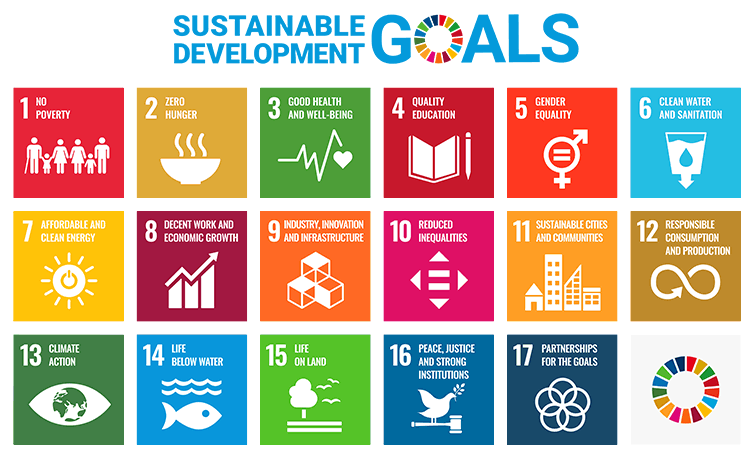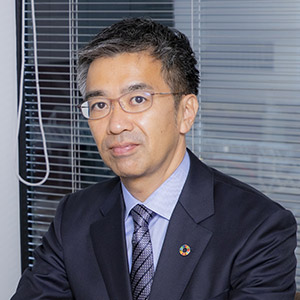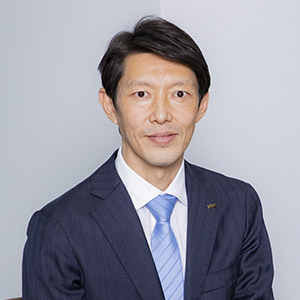The spirit of "creating happiness and prosperity together,” which the DyDo Group espouses as its management philosophy, bears similarities to the SDGs. In addition, the slogan for Group Mission 2030, “create enjoyable, healthy lifestyles for people around the world,” also has commonalities with the targets of the SDGs. Through its business, the DyDo Group strives to achieve a world in which all members, including people, society and the Earth, enjoy vibrant health.
Conversation with experts on contributing to the SDGs
The DyDo Group will accelerate its efforts to achieve the SDGs by carrying out Group Mission 2030.

The Sustainable Development Goals (SDGs), which were adopted by United Nations Member States in 2015, refer to global efforts to achieve 17 goals and 169 targets by 2030 in order to build a better and more prosperous future.
It is the DyDo Group’s mission to contribute to the realization of a sustainable society, which the SDGs aim to achieve, through its business.

Professor Norichika Kanie (Graduate School of Keio University) and President Tomiya Takamatsu (DyDo Group Holdings) had a face-to-face talk. Professor Kanie, a leading expert in research on the SDGs, plays an active role in both domestic and international expert committees and is keenly involved in education and awareness-building regarding the SDGs.
(Implemented in November 2020)
What you need to know to understand the SDGs

The important point to note is that the SDGs represent the shape of the future. The SDGs, which every nation in the world aims to achieve, include all courses of action taken by each country. The SDGs have a special significance, serving as the first agreement by all member states on one comprehensive course of action.
Previously, sustainability used to be discussed mainly in the context of the environment. However, the SDGs also cover social and economic sustainability. Meanwhile, the SDGs do not accept a world in which only some people enjoy happiness while others live miserable or oppressed lives. The SDGs incorporate the ensuring of fairness and sociality.
The DyDo Group’s attitude toward the SDGs
It is legitimate for a business owner to interpret the principles of the SDGs from the viewpoint of the company’s management philosophy. By doing so, the course taken by the company in step with society will produce favorable results for the company.
The DyDo Group’s business started with sales on medicine on a “use first, pay later” basis, whereby medicine is placed in homes and workplaces and later the used medicine is replenished. From this starting point, we then made energy drinks and sold them from small vending machines at drive-in facilities (Note 1) to allow drivers to rid themselves of their drowsiness. Subsequently, these vending machines began to sell canned coffee as well. This sales style is an outcome produced by our insatiable desire to improve our business in quest of better methods for providing needs-tailored products more efficiently in more accessible places. For further business growth and study on the feasibility of starting a new project, I want to expand the level of understanding and penetration of the management philosophy anew.
Challenges addressed by the beverage and food industries
I think the most burning issue for the food and beverage industries is food loss. It is true that attention must be directed toward how to deal with food itself. However, it is also important to consider how to deal with containers. Regarding containers, plastic bags are now charged in Japan as of this year. Marine plastic pollution is another issue attracting public attention. The spotlight centers on recycling—in other words, where used items go.
I recognize food loss as a crucial issue to be addressed by the relevant industries as a whole. We have been making efforts by reviewing traditional practices, for example, extending food expiration dates. We also intend to be more thorough about not making unnecessary products.
As you mentioned, dealing with containers is an important issue too. We must also continue to pursue the theme of how to carry out the 3Rs (reduce, reuse and recycle) as a company.
To demonstrate the DyDo Group’s uniqueness, the most effective way must be to make a meaningful contribution to society by providing vending machines in disaster situations. When a large earthquake occurred, the volume of emergency food supplies at an evacuation shelter was insufficient for the number of evacuees there. These supplies were not distributed to the evacuees and were eventually thrown away. In such cases, I think vending machines are better at regulating supplies than humans.
Disaster is a theme often covered by the SDGs. Companies are required to build resilient (Note 2) businesses. As Goal 11 of the SDGs specifies, companies need to attain the strength that enables them, in disaster situations, to recover immediately and continue their business.

Impact of COVID-19
COVID-19 has brought home to us the fact that we are not sustainable, providing us with an opportunity to reconsider how we live and how we conduct business. You can protect not only yourselves but also society by taking preventive measures against COVID-19, including wearing a face mask, gargling and washing your hands. It can be said that actions taken by individuals affect the entire world. I believe that this is a good opportunity for even companies to carry out reform. By incorporating digital transformation, we can build a better society.
The COVID-19 pandemic has significantly changed people’s lives. Changes in people’s movement affect our sales. For example, the proliferation of working from home has decreased sales of products sold through vending machines installed in urban areas; however, sales in some locations, mainly in rural areas, have remained steady. The important thing is how swiftly we can respond to these changes. I have continued to say “a change is a chance” ever since I took office as President. In our vending machine business, during the COVID-19-related crisis, we have further accelerated our business process transformation by, for example, reviewing the allocation of sales resources and conducting business negotiations online. The predicament has changed the circumstances. However, we can manage to take advantage of the change to yield favorable results little by little. I believe that it is crucial for us to take on new challenges in order to become a more resilient company.
Efforts required to be made by companies in terms of health
Group Mission 2030 covers efforts to be made from the following four viewpoints: health, the environment, innovation and people. Of the four, we place prime importance on health because it has a strong affinity for our business.
These days, partly because of the COVID-19-related crisis, we often hear the term “health” in various places. Health, including not only physical health but also mental health, will become one of the most important terms.
I agree. Our group companies are conducting their business with a major focus on health. Japan is faced with the issue of an aging population. Therefore, the key is how to extend the healthy life expectancy.
The DyDo Group intends to provide products that are beneficial to people’s health: to be more specific, products that help people avoid getting sick.
Efforts required to be made by companies in terms of the environment
In the field of the environment, decarbonization is a major issue. When the increase in the future world population is taken into account, how efficiently limited resources are used takes on considerable importance. I think that this issue cannot be resolved without innovation or collaboration.
I also think that decarbonization is an important issue. However, to begin with, we have considered what efforts we can make to achieve a recycling-based society. To this end, we have established the targets to be attained by 2030.

Empty-container collection rate: collection implemented in collaboration with other companies is included
Calculation basis: weight of the relevant containers collected / weight of the relevant containers shipped
Relevant containers: plastic bottles, glass bottles, aluminum cans and steel cans

* plant-based or recycling based materials

Innovation and partnership toward the achievement of the SDGs
I believe that innovations are born out of inspiration found by combining different elements together. For example, vending machines with an additional function other than their original function of selling beverages may produce more beneficial effects. I expect that these types of efforts will be made. I think young people’s inspiration is particularly helpful.
That idea is also in line with how the DyDo Group conducts its business. The DyDo Group encourages a project called the “Challenge Award,” where awards are given to excellent ideas selected from among those submitted by all employees. The selected ideas are to be implemented in the near future. We pride ourselves on our work environment, in which completely new ideas can be realized. I desire to develop our corporate culture to allow young people to produce still more ideas and take positive action.
If you lack something, you need to collaborate with people who have that thing. If you cannot resolve the issue by yourself, it is important to bring in another perspective from outside and achieve the best mix. Without doing this, the great ambition of the SDGs cannot be achieved. This is why Goal 17 is included in the SDGs. I am sure that the DyDo Group’s open-minded corporate culture where ideas are easily produced leads to collaboration.

The DyDo Group originally expanded its business in collaboration with other companies. On the one hand, in our domestic beverage business, we entrust the manufacturing to other companies. On the other hand, in the pharmaceuticals-related business, we are entrusted by other companies with the responsibility of manufacturing. Even when we expanded our international beverage business internationally, the existence of partner companies was indispensable. The concept of partnership lies in the extension of our existing course of action. Therefore, it is easy for us to achieve partnership.
DyDo Group’s contribution to the SDGs
There are close similarities between how the Group should be, which is specified in Group Mission 2030, and the SDGs. By advancing the spirit of "creating happiness and prosperity together,” which we uphold as our management philosophy from the beginning, we strive to achieve a world that benefits four parties: the seller, the buyer, society, and the future.
I chimed in with the spirit of "creating happiness and prosperity together.” The concept that a company can be sustainable only when it develops together with society is exactly what the SDGs require. The key point is that creating happiness and prosperity together with future generations is important, as well as those with people living today, which can be learned from the SDGs. I would like you to spread this vision to your group companies.
Under circumstances where other companies have also been making efforts related to the SDGs, I expect the DyDo Group to take differentiated measures. One possibility is to use vending machines. Vending machines have the potential to function as useful social infrastructure.
I have been thinking that I should spread our management philosophy even more eagerly. Upholding the company’s goals is not enough. It is important that these goals sink in until they inspire the employees’ actions. This is a challenge to be continuously tackled: to make the employees think of the company’s goals as their own personal goals and then put their thoughts into action.
It is essential to have the employees understand that the SDGs are to be achieved by all people as a body, not by specific persons.
At present, there is a gap between what companies can do and what the SDGs require. I would like companies to think about how they can close the gap. It is not recommended to take a one-sided view of your business, for example, DyDo DRINCO is only for canned coffee or Tarami is only for fruit jellies. I hope you will conduct multifaceted checks on your business based on the SDGs, and enjoy thinking what you can do toward your goals.
Goal setting is just a stepping stone. I will continue to consider how we can achieve our goals. Together with each employee, the DyDo Group will make a worthwhile contribution to realizing a world that the SDGs aim to achieve by exploiting our distinctive strengths.

Norichika KanieProfessor, Graduate School of Media and Governance, Keio University
PH. D. in Media and Governance
Laboratory representative leader, xSDG Laboratory, Keio Research Institute at SFC
He studies issues related to global environmental governance, in particular, global warming and climate change. His recent publications include SDGs (Sustainable Development Goals) (2020, Chukoshinsho, Chuokoron-Shinsha), and he has also written and edited many other books.
